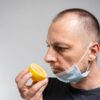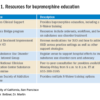![1]()
News
Neurologic disorders ubiquitous and rising in the U.S.
March 2, 2021
Most of the rise in disease burden could be attributed to population aging, while age-standardized figures showed stroke and dementias to be level or declining, offering hope that prevention measures may be having an effect.
![1]()
News
Loss of smell lingers post COVID-19
February 24, 2021
The fact that the sense of smell had not returned to normal for half the participants so long after being infected is “novel and quite striking.”
![1]()
Opinion
When the X-Waiver gets X’ed: Implications for hospitalists
February 17, 2021
Hospitalists can be leaders in further adopting buprenorphine as standard of care for people with OUD.
News
Tough pain relief choices in the COVID-19 pandemic
February 1, 2021
The investigators found no evidence of a harmful effect of NSAIDs on COVID-19–related deaths.
News
COVID-19 may damage blood vessels in the brain
January 20, 2021
A postmortem study reveals signs of vascular inflammation in the brains of deceased patients.
![1]()
News
HHS will drop buprenorphine waiver rule for most physicians
January 19, 2021
There were more than 83,000 deaths attributed to drug overdoses in the United States in the 12 months ending in June 2020.
![1]()
News
Covert stroke after noncardiac surgery linked with cognitive decline
January 19, 2021
Does covert stroke increase the risk of cognitive decline after noncardiac surgery in patients older than 65 years?
News
Physicians react: Doctors worry about patients reading their clinical notes
January 11, 2021
As part of the 21st Century Cures Act, patients will now have the right to see their medical notes.
News
Microvascular injury of brain, olfactory bulb seen in COVID-19
January 5, 2021
Vascular pathology and perivascular infiltrates found on postmortem MRI scans may be informative when interpreting brain changes on MRI scan in patients with COVID-19.
![1]()
News
The top pediatric articles of 2019
December 22, 2020
The ten articles that had the most impact on pediatric hospital medicine, as presented at HM20 Virtual.





